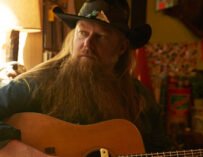
Jonathan Donahue: “There just seems to be something in Bobbie’s work, besides the guitar playing which is wholly original”
The frontman of psych-pop veterans Mercury Rev reveals his love for the Mississippi songwriter and why they reimagined her album
For their latest project, those masters of psych-pop Mercury Rev have teamed up with a number of female vocalists and reimagined Bobbie Gentry’s 1968 album The Delta Sweete. Here, the band’s frontman reveals a little more about his love for the Mississippi songwriter and what inspired them to update a record which had largely faded from view.
“Growing up in America in the late 60s and early 70s I came across Bobbie Gentry, or she came to me, the way she did pretty much everybody, with Ode To Billie Joe. It was such a massive song on the AM radio here. Even as a young child I sensed there was something very different about this song than a lot of the other psychedelic ash that seemed to be covering everything else. I was too young to know that it was a country record or what she might have been throwing off the bridge but I knew there was a mystery there and that seemed to imprint on me at a very young age – like how a duckling imprints on a ping pong ball when it’s born, it was just something that stayed with me, the emotional content of it.
“Looking back there are some haunting moments in the four-minute arc of Ode To Billie Joe. That drew me, much later in life, to The Delta Sweete, which I only listened to about eight years ago. I noticed on a whole listen through of that record that it was giant theatre; it wasn’t just a three-minute pop song; begin it, have a middle, have some tension and release it by the end. The theatre seemed to go through the whole album and that’s something that I’ve always resonated with and would have been the emotional glue that held me pretty fast to The Delta Sweete.
“I think there’s a sense of home. Whether you’re singing about The Delta or the Catskills or the Lower East Side of Manhattan in the mid- 60s, like the Velvets did, it’s that sense of place. And maybe it doesn’t have to ring with a sentimental syrup dripping off of its edges, there can be a neutrality. Almost a detachment and subjective plein-air painting of the landscape in which you live or remember. That’s the part of it which helped us enter into the rearrangement and the revisiting of her album – our own sense of place.
“It was sincere to enter our world but with the sentiment and genuine affection which she seemed to have for her world. Her world being the South, the Delta, which in America is always at arms-length from almost all of the other regions of the country. It is so specialised in its emotional trajectories; historically and culturally. And so for three men from the hinterland of Upstate New York to pretend that we were Delta bluesmen wasn’t gonna happen, we weren’t looking for that. But we knew we could try to get in touch with some of that authentic love of place and a love of place that seemed to permeate The Delta Sweete itself.
“There just seems to be something in Bobbie’s work, besides the guitar playing, which is wholly original – it’s almost Django or jazz-like. But there seems to be something where she was able to detach from the syrup which was in a lot of songs at the time, especially in country music, and she just seemed to paint it the way it is, or at least it was to her. That’s something you don’t hear, especially in modern country music – everything just has these rose-coloured glasses on. What if things were different, what if things were better? I never got that from The Delta Sweete, I got this panoramic view of it through eyes that didn’t seem to judge it one way or the other.
“I don’t know that you can approach the truth from one side, or from an angle – the truth is something boundless and infinite. I think there’s something deeper that goes on in country music, or opera or anything that has a landscape to it, if it’s to stand the test of time it has to be approached all at once and not just from one angle of emotional sentiment.
“I hear the original as a whole statement, a complete thought, which is something you work hard for in songwriting. It doesn’t have to be twelve songs spaced apart across a whole record, just one complete thought. That’s what I hear in The Delta Sweete, even with the cover songs which she wholeheartedly must have thought well and good about. The tapestry is complete to my vision, I don’t know about hers or even hers at the time, but for someone walking in and seeing it on the wall I say, ‘Yes, there’s a complete thought.’
“Early on, we all decided that we were not looking to get a response from her or shake her out of any contemplative calm that she’s probably worked very hard to achieve. We weren’t looking for a response or to hook someone out of their hard-fought solitude away from the music industry spotlight. The purpose of the record wasn’t to say, ‘Hey where’s Bobbie,’ it was the opposite, to say, ‘It doesn’t matter where she is, this is something she accomplished and we’d like to shine a light on it,’ that’s it.
“As a writer, you absorb and carry everything with you to some degree, just like the universe it imprints on you and is there in subtle ways. I am sure her own sense of centre has only reinforced my own endeavours to have that as well – to maintain that against a lot of the noise and the din of the music world.”


































Related Articles